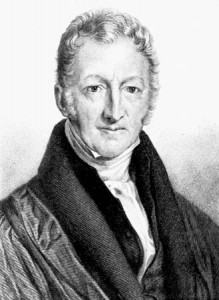At the turn of the nineteenth century, most of Europe had become embroiled in the enlightened idea that society could progress nearly infinitely through the use of reason. Writing in England in 1798, the Reverend Thomas R. Malthus proposed a view of economics centered on population patterns. His Essay on Population suggested a view on human progress tainted by inevitability. He established two constants: food is necessary for mans’ survival and reproduction from the union of the sexes is necessary for mans’ survival. These serve as the foundation for a theory claiming the impossibility of humans ever escaping misery and vice. According to Malthus, the only way to keep the population in proportion to the means of subsistence is through disease and hardship killing off significant amounts of the population, or through a refusal of monogamous unions to produce children. Without “early attachment to one woman,” vice becomes unavoidable. ((Malthus, Essay on Population))
Malthus distinguishes between man and animal on the basis of reproductive instinct, something which animals carry out without thought. Man however, considers his ability to support children and whether or not he desires to work harder to provide for his children. He focuses specifically on the lower classes and how the discrepancy between their instincts and their economic means places them in perpetual poverty. The proposed economic model includes a “season of distress” ((Malthus, Essay on Population)) during which the poor must work harder to earn the same amount. Due to this stress, marriage is less likely and the population stagnates, until those at the top of society increase the means of subsistence through innovation, thus improving the lives of laborers just enough for reproduction to continue.
Despite the enlightened context of Malthus’ writing, his ideas contradict some of the foundational elements of enlightened thought. His theory does not seem to allow for the perfection of society since misery and vice are necessary just for mankind to continue surviving. It also arguably states that progress, or the increase of the means of subsistence, is only possible through necessity rather than reason. The plight of those at the bottom of society depicts them as mere cogs in a societal machine which fluctuates in a fixed pattern; not as enlightened peoples able to affect and improve their society through reasoned intellectual thought. Given when and where he was writing, I would like to ask why Malthus described society in this way, and what if any of his ideas are reconcilable with the enlightenment?
Picture from: http://media-2.web.britannica.com/eb-media/42/148842-004-D26D2C8B.jpg


I believe Thomas Malthus incorporates enlightened ideas in his Essay on Population. You mention that he distinguishes how men and animals use reproduction differently. Animals do not think nearly as much about the potential negative consequences of having children compared to men. I believe this very idea showcases how humans used rational thought at the end of the eighteenth century. Malthus argues in his essay that humans must consider the potential negative results of having too many children and how these consequences could affect the public good. He claims, “Impelled to the increase of his species by an equally powerful instinct, reason interrupts his career, and asks him whether he may not bring beings into the world, for whom he cannot provide the means of subsistence.” Although the instinct to reproduce may be great for men, they additionally have the capability to use reason to justify whether such a decision will reap a great deal of benefits. This thought process exemplifies how writers during the Enlightenment preached the importance of utilizing reason when making decisions.
While Malthus might contradict some elements of enlightened thought, he also agreed with some ideas of the Enlightenment Era in his essay. He argues that animals and man think about reproduction differently. He says that animals “are all impelled by a powerful instinct to the increase of their species; and this instinct is interrupted by no reasoning, or doubts about providing for their offspring.” Whereas he says that man ponders about if he can provide for his offspring before having a child. This observation shows that Malthus agrees that humans use reason, which is a key idea of the Enlightenment Era. While men do have a strong instinct to reproduce, they also have the ability to use reason to decide if it will be beneficial for the species to reproduce or not. Though this idea is not necessarily clear in his essay, an analysis of Malthus’ writing can show that he did use enlightened ideas.